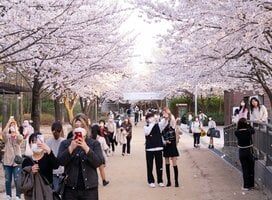Japanese Language Schools
If you’ve decided to take up Japanese as a second language, chances are you’re interested in more than just pronouns and verb tenses. Students of foreign languages are often just as curious to learn about the way of life of another corner of the world, and learning how to communicate is simply the gateway to those new experiences.
In your pursuit of flawless Japanese language skills, you may find yourself strolling down cherry-blossomed lanes in Kyoto, Japan or dining on scrumptious street cuisine in Taipei, Taiwan. When you let real-life experience living in overseas communities instruct you on the nuances of a foreign language, you open the doors to more cultural experiences all over the globe.
From program types to potential destinations, there are a few things to consider before you embark on a trip to learn Japanese abroad.
Mastering a language demands that you practice beyond the textbook. The following overseas program types blend language learning classes with cultural interactions, ensuring that you have opportunities to immerse yourself in the local community and apply speaking skills in real scenarios.
- Language Schools: Enrolling in a language school abroad is one common way to learn Japanese. These types of institutions, including Hokkaido JaLS, will also offer additional classes in other disciplines to help you expand your knowledge of Japanese culture. Not to mention, there are typically a few side excursions planned to help you and your peers experience Japanese culture more deeply.
- Homestay Programs: Another popular way to pick up and perfect your Japanese language skills is by staying with a family in Japan or Japanese-speaking regions of other countries. Homestay programs, like EF in Tokyo, will allow you to practice your Japanese 24/7 in the comforts of a local home. Plus, you’ll get to fully immerse yourself in the culture -- dining on traditional meals, taking part in family outings, and becoming a community resident.
- Internships: If you’re further along in your Japanese studies, you may be able to fine-tune your abilities with an overseas internship. Organizations such as the Tochigi International Education Institute can arrange internships in top industries, like hospitality. There will likely be a language learning component at the start of the program or throughout your stay, so gaining skills for reading, writing, or speaking will still be a focus of the trip.
Read more: The Ultimate Guide to Learning Japanese Abroad
Qualifications
While there are programs abroad for students who are just starting out with their Japanese lessons, having some instruction on the language prior to departure will make the experience all the better. English, though taught in schools, isn’t widely spoken in many Asian countries. Hitting the ground only knowing the basics of Japanese can delay or limit the number of interactions you’re able to have in the local community, which is arguably the highlight of any overseas language program.
Fortunately, other than gauging your level of ability with Japanese during the application process, the qualifications for this type of program are generally light. For hopeful interns, you’ll have additional application materials to submit, such as a resume detailing relevant work experience, and may also need to apply for a visa.
When preparing to take a trip abroad to learn Japanese, you’ll have to consider your options in regards to destination and course type. There are multiple places in which you can become adept at the language as well as a myriad of considerations to take into account when selecting the perfect program.
Popular Locations to Learn Japanese
Of course, the most natural place to learn Japanese overseas is in Japan itself. Here, students can gain holistic instruction on reading, writing, and speaking the language. Testing out conversational abilities is easy when the surrounding community is guaranteed to be fluent. From ordering a meal at one of Tokyo’s many acclaimed restaurants to visiting Shinto shrines in Kyoto, there will be plenty of opportunities to apply your budding language skills.
Another possible destination is Singapore, where programs like the Oxford Language Academy offer classes that will prepare students to test for Japanese language accreditation upon course completion if they so desire. Taiwan is also a wonderful place to learn Japanese. Formerly occupied by Japan, Taiwan’s cities, like capital Taipei, still instruct on the language in schools and universities.
Choosing a Japanese Learning Program
At the beginning, your level of proficiency with the Japanese language will greatly influence what type of program you opt to go with and where you pursue it. Beginners will be most comfortable in language schools and homestay programs, while intermediate to advanced speakers have the option to succeed in internships, as well. From there, hopeful overseas students of Japanese will have to consider what amenities they are looking for in a program.
Language schools will usually provide dormitory housing and included day trips to iconic local sites for their pupils. For interns, you can expect dorm living, while the appeal of a fully immersive program will attract other students to homestays. At the end of the day, your proficiency and cultural aspirations will determine the Japanese learning program you undertake.
If you’re thinking that acquiring Japanese language skills through an overseas organization might be out of your league financially, think again. Knowing the potential costs ahead of time will allow you to adequately prepare by saving money ahead of time and applying for scholarships.
Average Language School Tuition
Fees for Japanese language schools can vary according to your desired destination, the length of your program, and what extras, like meals and tours, are included. Basic courses, like semester-long language classes plus a few activities, can be in the $2000-$3000 range. Housing will typically require a few thousand dollars more top of that, with homestay options being a tad pricier.
Of course, programs that extend to a full academic year will be nearly double in all-around spending. Yet compared to regular study abroad courses, the average tuition for an overseas language school is relatively competitive with other programs.
Scholarship Opportunities for Learning Japanese
Like many academic pursuits, scholarships are available to help fund a trip to learn Japanese. From rewards for first-time travelers to incentives for continuing education, there are a diversity of options available for hopeful language learners venturing to Asia.
- Freeman-ASIA: Whether you plan on going to Japan, Taiwan, or Singapore, a Freeman-ASIA scholarship can make it all possible. If you’re a U.S. citizen, are in good academic standing, and meet a few other requirements, you’ll be eligible to apply. Plus, language students may receive preference over other candidates.
- Akamonkai: Most overseas language schools, such as Akamonkai in Tokyo, will have internal scholarships to which foreign students can apply. For this specific opportunity, applicants must meet the minimum enrollment period and attendance, as well as plan to pursue further studies after the program ends.
- KCP: As with language schools, independent study abroad programs can provide financial aid as well. Additionally, the organization may be able to point you towards external opportunities. With KCP, there are a host of both types of scholarships listed, all of which are geared towards students pursuing studies in Japan and elsewhere in Asia.

















